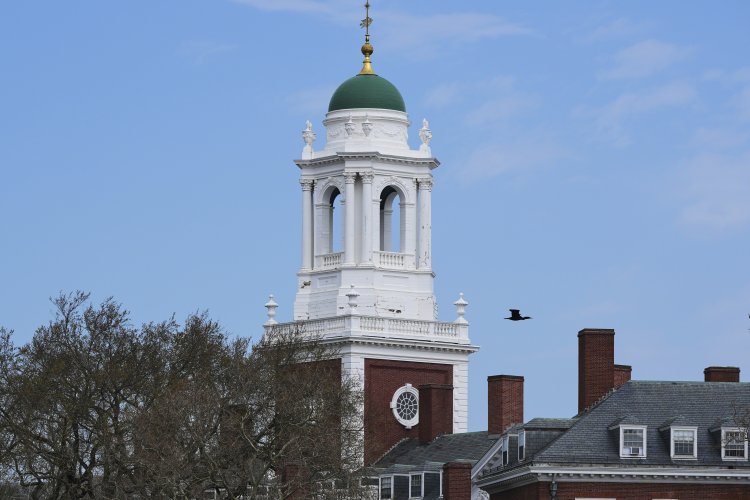The IRS Has Revoked a University’s Tax Exemption Just One Time. Here’s the Story.
Leveraging the IRS to promote a policy agenda, regardless of its merits, can lead to unexpected outcomes.

Similar to actions taken against other universities, the White House froze over $2 billion in federal funding, most of which is directed toward medical and scientific research. This is in addition to a potential funding freeze of $8 billion unless Harvard agrees to eliminate “DEI” from its curriculum and ban the use of masks. In response to the funding cuts, Harvard has filed a lawsuit.
President Donald Trump went further by questioning the university’s tax-exempt status. “Remember, Tax Exempt Status is totally contingent on acting in the PUBLIC INTEREST!” he posted on Truth Social. Trump argues that Harvard has not met the “public interest” standard because it has not adequately addressed antisemitism on campus; however, some Jewish leaders contend that he is politicizing efforts to combat antisemitism for a partisan agenda. The Anti-Defamation League, which had previously supported Trump’s “broad, bold set of efforts to counter campus antisemitism,” branded the funding cuts an “overreach” in an open letter, stating that the administration’s demands “go far beyond ensuring the civil rights of Jewish students and faculty.”
While this situation may appear unprecedented—and in many ways, it is—there is historical precedent for revoking a university's tax-exempt status, a move that could have devastating financial implications, including making the university’s endowment income taxable and preventing donors from receiving charitable tax exemptions.
Trump’s reference to “public interest” recalls an earlier confrontation between the IRS and a university. In 1983, the Supreme Court ruled 8-to-1 to uphold an IRS decision stripping Bob Jones University of its tax-exempt status. BJU, an evangelical institution in South Carolina, had a policy that barred interracial dating on campus and only allowed Black students to enroll if they were married to other Black individuals, thereby reinforcing its ban on interracial relationships. This case marked the culmination of a decade-long struggle in which the IRS targeted not only BJU but also a range of segregated Christian academies—private schools closely tied to evangelical churches.
The court found that enforcing civil rights laws was a matter of “fundamental national public policy,” squarely within the IRS’s authority. Now, it appears that the Trump administration seeks to apply this same ruling to frame the battle against campus antisemitism and “DEI” as “fundamental national public policy,” thereby empowering the IRS to take action against Harvard.
Yet this bears a cautionary message for Trump. The IRS’s efforts to dismantle segregation in private Christian schools and colleges ultimately unified the evangelical right into a significant political force. While civil rights advocates may have won individual battles, they lost the broader war. If history is any guide, the administration’s heavy-handed tactics aiming to compel Harvard to conform may result in short-term victories but long-term repercussions. In the 1970s, many perceived the IRS’s actions as excessive government overreach, leading to a backlash that could serve as a warning to the MAGA movement.
The roots of the IRS confrontation with BJU trace back to President Lyndon Johnson’s Great Society initiatives, which significantly expanded the federal government’s influence over educational institutions, particularly regarding civil rights. Funding was a key factor; the 1965 Elementary and Secondary Education Act boosted federal contributions to public schools from $2.7 billion in 1964 to $14.7 billion by 1971, making federal funding account for upwards of 30 percent of some Southern districts’ budgets. Simultaneously, the 1965 Higher Education Act increased federal funding for post-secondary education, largely because the government relied on universities to conduct crucial defense, scientific, and health research. This created a financial incentive.
On the punitive side, the Civil Rights Act of 1964 prohibited segregation in public accommodations and specifically barred federal funds to segregated institutions under section VI. The results were remarkable: from 1965 to 1968, the percentage of Black students in majority-white Southern schools surged from roughly 2.3 percent to almost 23.4 percent, continuing to climb until it peaked at 43.5 percent in 1988.
Bob Jones University became a focal point next, as it prohibited interracial dating and marriage among its students based on its interpretation of biblical teachings. This policy remained in place even after allowing Black students to enroll in 1971.
In 1970, the IRS modified its regulations to declare that private schools enforcing racial discrimination were not eligible for tax-exempt status under Section 501 of the Internal Revenue Code. Consequently, on November 30, 1970, the IRS informed BJU of its intent to revoke the university’s tax-exempt status.
BJU appealed this decision, leading to a long legal battle that traversed multiple presidential administrations. Importantly, throughout this period, the IRS's actions against BJU remained consistent under the Nixon, Ford, Carter, and even Reagan administrations. Acting independently, especially post-Watergate, when attempts to politicize the IRS were revealed, the IRS largely functioned without political oversight.
BJU vigorously defended itself against the IRS’s attempts to revoke its tax-exempt status, claiming that its policies were based on sincerely held religious beliefs. The university filed a lawsuit in 1971 to block the IRS from rescinding its tax exemption, arguing that such actions infringed upon its First Amendment rights. However, the Supreme Court determined in Bob Jones University v. Simon that BJU did not have standing to sue until taxes were assessed.
In 1975, anticipating potential legal issues, BJU slightly adjusted its admissions policy to allow unmarried Black students to enroll but simultaneously enforced stricter rules against interracial dating and marriage, including expulsion threats for students engaged in or advocating such relationships. The IRS officially revoked BJU’s tax-exempt status in 1976, retroactively effective to December 1, 1970.
The IRS’s focus then turned to private segregated primary and secondary schools, many aligned with Christian churches. In 1978, during President Jimmy Carter's administration, the IRS commissioner announced plans to suspend the tax-exempt status of private Christian academies that failed to integrate. Founded in the 1960s and 1970s, many of these schools allowed white Southerners to sidestep federal court mandates for enforcing integration through busing and pupil placement tactics. For instance, Mississippi saw the number of “segregation academies” rise from 17 in 1964 to 155 by 1970, paralleling the federal government’s threats to cut off federal school funding to non-compliant districts.
The Lynchburg Christian School in Virginia, established by Rev. Jerry Falwell, was emblematic of the broader issue. Among its 1,147 students, only five were Black. The government had already set a low bar for integration, necessitating that a school’s minority enrollment simply matched 20 percent of the portion of minorities in the larger community. Therefore, if a town had a Black population of 10 percent, a school needed only 2 percent minority enrollment to retain its tax-exempt status. For many Christian conservatives, however, this standard felt intolerably strict. “It was the IRS trying to take away our tax exemptions that made us realize that we had to fight for our lives,” Falwell remarked.
The IRS’s maneuvers had unintended political ramifications. “It kicked the sleeping dog,” Richard Viguerie, a prominent conservative fundraiser and strategist, explained. “It galvanized the religious right. It was the spark that ignited the religious right’s involvement in real politics.”
Building on popular backlash against the IRS announcement, Falwell established the Moral Majority in 1979, quickly positioning it as the leading political organization for the evangelical right. Together with groups like the Christian Voice, Moral Majority unified various local activists and organizations that had first emerged during anti-gay, anti-pornography, anti-Equal Rights Amendment, and educational campaigns of the mid-1970s. Millions of conservative Christians, lacking strong national leadership, turned to grassroots activism. Poised for engagement, the newly organized Christian right aimed to leverage its influence in the upcoming 1980 elections.
Contrary to common belief, it wasn’t abortion, gay rights, or school prayer that solidified the Christian right; it was the IRS’s push to implement desegregation through federal tax policy in colleges and schools.
In the end, most Christian academies chose to close rather than comply with the IRS’s desegregation mandates. Bob Jones University held out longer, paying a nominal tax to establish standing and subsequently filing for a refund, resulting in a protracted legal battle. The Supreme Court ruled in Bob Jones University v. United States in 1983 that the government’s interest in eliminating racial discrimination in education outweighed the university’s religious freedoms, thereby upholding the IRS’s ruling.
Despite this, BJU opted to maintain its ban on interracial dating and eventually paid roughly $1 million in back taxes. The institution did not lift the ban until 2000 amid growing public scrutiny related to then-Texas Gov. George W. Bush’s campaign stop at the campus. In 2008, BJU issued an official apology for its racially discriminatory policies and regained its tax-exempt status by 2017.
The IRS's success in changing BJU’s policies might tempt the Trump administration to see it as a model. Although BJU withstood pressure for decades, it ultimately succumbed.
The long-term effects of these actions should serve as a cautionary tale. The IRS’s approach transformed a disparate collection of evangelical Christians and Catholic social conservatives into a potent political movement. This movement capitalized on the notion of government overreach to unite a broader coalition of Christian conservatives and advocates for limited government.
The current assault on universities could potentially spark a similar reaction. There exists a wide array of stakeholders concerned about medical and scientific research. Alumni from both prestigious and less well-known research universities care deeply about their institutions' futures. Families that rely on these universities for healthcare services use their hospitals and affiliated medical centers, while municipalities depend on them for employment and social services, as well as voluntary contributions in lieu of property taxes. Harvard alone funds over 7,000 units of affordable housing, provides free legal aid and mobile health clinics, and collaborates with local nonprofits to tackle food insecurity—among many other initiatives.
The lesson for Trump is evident: when the IRS is weaponized to pursue public policy aims, even those that may seem justifiable, unforeseen consequences can arise.
Thomas Evans for TROIB News












